Angela Ackerman's Blog: Writers Helping Writers, page 174
September 17, 2012
The Benefits of Misunderstandings
Happy Monday!
In case you see those two words as oxy-moronic, here, have one of these:

Image courtesy of thesparechangekitchen
And a couple of these...

Courtesy of Catie Rhodes
Oh, and some healthy fruit....

Courtesy of ambernwest
Ahhhhh. Much better. Today, I'm at Peggy Edelman's blog, Will Write For Cookies, talking about how misunderstandings can benefit your story. Bring your goodies and join us :).

In case you see those two words as oxy-moronic, here, have one of these:

Image courtesy of thesparechangekitchen
And a couple of these...

Courtesy of Catie Rhodes
Oh, and some healthy fruit....

Courtesy of ambernwest
Ahhhhh. Much better. Today, I'm at Peggy Edelman's blog, Will Write For Cookies, talking about how misunderstandings can benefit your story. Bring your goodies and join us :).

Published on September 17, 2012 05:00
September 15, 2012
Character Trait Entry: Just

Definition : believing in or pursuing what is morally right or good
Causes : a religious upbringing that focuses on right vs wrong; growing up in an environment where fairness was emphasized; fear of doing wrong or being perceived as doing wrong; fear of punishment; a self-righteous attitude; wanting to be "better" than others; wanting to be seen as better than others
Characters in Literature & Pop Culture: Robin Hood, Dumbledore, Reverend Mr. John Williams (The Scarlet Letter)
Positives : Just people long for things to be made right. They rail against injustice and are quick to stand up for the oppressed. They aren't afraid to try and right wrongs, even when their beliefs bring them into conflict with powerful or influential people. Because their beliefs are constantly being challenged by those in opposition, just characters are usually well-spoken and are able to intelligently defend their point of view.
Negatives : It's easy for just characters to be more concerned with right/wrong than they are with people. They tend to see things in black and white and can easily slip into stereotypical or judgmental thinking. Taken to an extreme, the just character lacks empathy and mercy, and can become vigilante in their desire for justice. They can also become so devoted to their opinions that they're unable to see or admit when they're in the wrong
Common Portrayals: religious figures, judges, social activists
Clichés to Avoid: the self-righteous, hypocritical priest or pastor; the just character who bravely stands alone in his quest to right a wrong
Twists on the Traditional Just Character:
Just characters are usually bold and confrontational. How about a meek or wallflower-type person who is compelled to stand up for what's right?
People with a strong sense of right and wrong are often firmly convinced of their own rightness. It would be refreshing to see a just character who takes a stand on something, but struggles with his own convictions on the subject.
The self-righteous just character has been done to death. There are so many other faults and flaws that can realistically be applied. Break the cliché and come up with a new pairing of strength with weakness.
Conflicting Characteristics to Make your Just Character Unique or More Interesting: timid, coarse, depressed, grouchy, popular, unintelligent

Published on September 15, 2012 00:30
September 14, 2012
After The First Draft: Attitude Is Everything
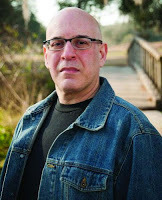 Hi Everyone! I am super-pleased to welcome author Peter Salomon to the blog. Peter's new YA book, HENRY FRANKS just released through Flux and I can't wait to snag a copy. The blurb is at the end--read it and you'll see why! However, just to tease you a little, here's a snippet:
Hi Everyone! I am super-pleased to welcome author Peter Salomon to the blog. Peter's new YA book, HENRY FRANKS just released through Flux and I can't wait to snag a copy. The blurb is at the end--read it and you'll see why! However, just to tease you a little, here's a snippet: Four thousand, three hundred and seventeen stitches, his father had told him once.
All the King's horses and all the King's men had put Henry Franks back together again.
Now here's Peter & his thoughts on After The First Draft.
~ ~ * ~ ~
Congratulations, you've finished the first draft of your novel! I'm serious, this is something that calls for a minor celebration. There are untold numbers of people who have thought "I should write a book" and never started, or started and never finished. You've finished! This is great.
Now the hard part starts.
Yes, I'm sorry to have to be the bearer of bad news but, all things considered, writing that first draft will probably turn out to have been easier, simpler and FAR quicker than revising/editing the thing.
But, and this is important: just as there were times while you were writing that first draft where you might have wanted to give up, thinking 'this'll never be over' or 'this is taking forever' there will be those same moments as you edit...and, guess what? Just as you did finish that first draft, you will finish the second draft as well.
Of course, there will most likely be a lot more rounds of revision before your novel is ready to query agents about. And, even then, after signing with an agent? More edits. After the novel sells? Yes, that's right: more edits.
So, there are two ways to look at that finished document, after typing "The End" for the first time on that first draft: 1) It's perfect as is, I hate editing, let's query now and 2) EVERYTHING else...because #1 is a TERRIBLE idea.
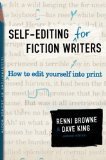

There are a number of wonderful books out there to help you edit (my personal favorite is 'Self-Editing For Fiction Writers' by Renni Brown and Dave King so the actual nuts-and-bolts of editing and revising can be found elsewhere.
Instead I'd like to talk about 'Attitude.' Yes, attitude.
I know editing is hard, revising seems insurmountable, the book's done, it's hard to work up the same passion once 'The End' has been typed, that passion that drove you to the page, kept you thinking of the characters even when you weren't writing, had you having conversations between your characters in your head as you drove or showered or slept. That's the power of writing, it's so much a part of why we do what we do and it's wonderful.
That passion kept you writing even when you wanted to give up, even when the end of that first draft seemed so very far away.
And now you're done, you celebrated finishing the first draft. You told everyone you'd finished your novel. You posted it on Facebook. You Tweeted it.
Now the celebration is over and you have two things left to do. They are NOT query and sell the novel. I know, that's the goal and it's within reach now that you've finished that first draft. But not quite yet. Not now.
1) Let it sit. Untouched. Unread. A lot of people will tell you to let it sit for a certain number of weeks. Even a month. More. Let it sit. Ignore it. This is great advice. Has no relation to the reality of the pull that manuscript will have on you, calling to you: "Read Me!" So, my advice isn't so much a time frame as it is another 'attitude.' Let it sit just a little longer than is comfortable. As in, if a week after you finished you feel up to that read-through, that first round of edits, then give it just another day or two and get to it. Just let it sit long enough so that the passion starts coming back for those characters, that plot.
2) Revise and revise again, so many times that you honestly can't answer people when they ask 'which draft are you on?' And it's not a matter of 'each draft' being a complete revision or edit. Sometimes you go though the manuscript looking to fix one particular thing every time it pops up (see The Emotion Thesaurus for an example: you might be simply fixing how many times your main character shrugs on one read-through).
And 3) most importantly of all: love that revision process. Know that anyone who takes the time to give you constructive criticism has only one goal in mind: helping YOU make YOUR manuscript better. They are trying to help, always. And helping is good. Revising is good. No matter how long it takes, no matter how many times you want to give up, throw in the towel, raise the white flag. One day, you'll look back after finishing a final read-through and remember that first draft and you'll realize how much work it really did need, how much work you did, how much better the final version is.
And it will all be worth it the first time you post to Facebook that you sold your book. And Tweet the cover art. And open the box with the ARCs from your publisher. Hold the finished book in your hands.
That is the goal. Loving revision will help you get there. Because you will have to revise and edit no matter what attitude you go into the process with, so you might as well learn to love it. It will make it easier, it will make your agent and editor love working with you (always a good thing). And it will teach you so very much, so that when you sit down to start writing your next book you won't make the same errors (oh, there will always be new errors to make but still) the next time will be just that little bit easier. And you'll love the process just that little bit more.
And that calls for another celebration!
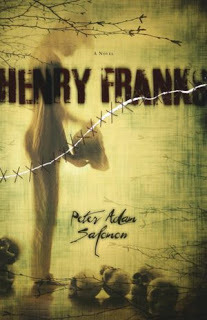 ~ ~ * ~ ~
~ ~ * ~ ~One year ago, a terrible accident robbed Henry Franks of his mother and his memories. The past sixteen years have vanished. All he has now are scars and a distant father—the only one who can tell Henry who he is.
If he can trust his father.
Could his nightmares—a sweet little girl calling him Daddy, murderous urges, dead bodies—help him remember?
While a serial killer stalks their small Georgia town, Henry unearths the bitter truth behind his mother’s death—and the terrifying secrets of his own dark past.
Sometimes, the only thing worse than forgetting is remembering.
(I promised you a killer blurb, didn't I?) Like Peter, I think attitude is what gives writers the fortitude to see a book through from first draft tot he shelf. Adopting a learner's spirit will help you embrace the revision process. It becomes a wonderful thing to see a book evolve from humble beginnings to a final. polished and world-ready tale.
A big thank you to Peter for hanging out with us, and showing what sustained him through the process. If you would like to find out more about HENRY FRANKS, you can visit Peter's website and read the first scene of the book and if you like, add the book to your Goodreads list. Find out more about Peter at his blog, follow him on Twitter & Facebook!
Musers, your turn! Did you find you needed to shift your attitude to push through the revision process? What helped you persevere?

Published on September 14, 2012 03:04
September 12, 2012
Building Suspense: Meeting Readers In The Middle
When thriller author Donna Galanti contacted me about guest posting here at The Bookshelf Muse on building suspense, I was all over it! As a writer on the dark side of Middle Grade and Young Adult, suspense is as alluring to me as the scent of bacon in the pan. And suspense isn't only about Thrillers and Who-dun-its...every book and genre has it's own brand of suspense, meaning catching and keeping the reader's attention requires some serious skill. Donna has 8 great tips for building suspense...I hope you enjoy this post as much as I do!
Writing Suspense: Meet Them in the Middle and They Will Come
I’ve learned so much about suspense since writing my first book. One thing I’ve learned in fiction, and movies, is that surprise can be over-rated.
Surprise is the two-seconds of “Boo!” Suspense is the ten-minutes of “Oh, No! Will she die or not?” We’ve all heard go for suspense when you can–and for a reason. It keeps the reader turning pages.
This means the reader needs to know a few things (without giving it all away) so they can predict things, and feel smart. Readers love feeling smart. Don’t we all?
I’ve discovered that if we meet the reader in the middle and let them feel smart, that they will stick with you.
But how can we, as writers, meet the reader in the middle to create suspense?
Tease them with only a few descriptive details
In Harry Potter we all know what Hogwart’s Castle looks like, don’t we? But if you go through the book there are very few descriptions about it. It’s introduced only as a vast castle with lots of turrets and towers. When Harry enters it we’re teased with brief images of flaming torches and a magnificent staircase. That’s it. The reader must fill in the rest with imagination.
By giving the reader flashes of the setting here and there we involve the reader, take them along for the ride, and…build suspense.
Introduce questions early on
Not just one, but many. Drop them here and there. Don’t make it tidy. Make it mayhem with meaning. But make sure those drops do have meaning.
If a knife appears hanging on the wall in the beginning, the reader will question why its there and believe that the knife has importance down the road. (So make sure you show its reason…later.)
Make the reader ask: What happens next? In Watchers by Dean Koontz we witness a depressed man who goes off to a canyon to commit suicide. Will he go through with it? Then he meets a highly intelligent dog and fears for his life from an unknown stalker. Through the dog he meets a timid woman he is intrigued by.
Now we have more questions. Who is this dog? Who is this stalker? How are they connected? Who is this woman? Why is she so shy?
Provide readers with knowledge
New novelists can often be afraid of revealing their best stuff early on. I used to feel the same way. There are tons of pages to fill, after all. That fear can make a writer hoard their best stuff for a surprise–later. But the reader can get bored with waiting, and surprises are overestimated.
Hitchcock, the master of film suspense, used this to build his tension in his movies. He gave the audience information the characters knew and didn’t know, such as the bomb located under their desk.
Tick tock.
Will the character die? Yikes! Maybe, if we’re given all the information we need to suspect death is looming. What makes this suspenseful? Because we spend ten minutes hoping beyond hope the character we love doesn’t die! In the movies or on the page.
Look at the big picture
Movies can provide great visuals for how writers can create suspense. Multiple setups can lead to one big suspense payoff. It’s the knowing what’s about to happen, and then it happens.
In The Godfather, Michael Corleone plans to kill the two mob leaders he meets for dinner. We see the murder planning. The discussion of where to meet. The finding of the gun in the bathroom as a weapon. The wondering of whether Michael will or won’t do it. The knowing that his life will be forever changed if he does.
Creating suspense with a big picture buildup can also create surprise. Here is where surprise can work if everything that led up to the surprise is exposed in a new way.
The big moment at the end in The Sixth Sense isn't just a surprise–it re-arranges everything we know about the events we've seen beforehand in a new way. Did you guess it coming or were you totally surprised?
Set the mood
Provide a suspense setting that creates feelings of heightened anxiety. Give the reader the portent of doom. The setting of a scene can make a large impact on its mood. Use sensory details to build on those feelings–a sudden wind, a stormy sky, a rising stench, a jarring noise. Use world building to create suspense.
Here’s an example of how I aimed for this in my suspense novel, A Human Element:
The sky darkened suddenly. She looked up. Black clouds, thick and angry rolled overhead. Her heart raced faster. The bad feeling screamed again inside her.
"Let's go inside for now." Laura tugged on her mother's sleeve. They would be safer in the house. She just knew it.
"But we can't let our chores go." Fanny's fingers flew across the peas. Slit. Pop. Slit. Pop. Wind whipped around the corner of the house. It knocked over Laura's basket.
Do you think something bad is coming?
Go slow
You’re saying whaaat? Yes. Slow down real time to show the full 360 degrees of the scene. In real life action happens fast. But it’s our job as writers to not show real life. That would be boring and over with in a flash. Show all the angles of the scene to build suspense. Use all the senses. Add complications.
I just read Robert Goolrick’s, A Reliable Wife. In it he moves achingly slow to build suspense. In the beginning scene a man waits at a train station. Nothing is happening. But so much is happening. And so much is to come.
His first paragraph tells us:
It was bitter cold, the air electric with all that had not happened yet. The world stood stock still, four o’clock dead on. Nothing moved anywhere, not a body, not a bird; for a split second there was only silence, there was only stillness. Figures stood frozen in the frozen land, men, women, and children.Oooh, right? Look at his words. Bitter. Electric. Dead. Still. Frozen. Besides going slow he’s also setting the mood with his word choices. These are not soft words. We have a sense of doom. For eleven pages at the train station Goolrick goes slow to build suspense and tension all by focusing on one man’s thoughts and the people who flow around him.
Think that’s going slow? The master of suspense, Dean Koontz, builds suspense over seventeen pages in Whispers with an attempted rape scene.
And don’t forget to create characters to care about
This doesn't mean they shouldn’t be flawless. Giving them flaws makes them more appealingly human, but you won’t create suspense if nobody gives a hoot about your characters.
 Suspense is emotional. It’s about revealing some, but not all.
Suspense is emotional. It’s about revealing some, but not all.
And if the reader cares they’ll go out on that limb and meet you in the middle. Build it halfway to create suspense, and they will come.
Donna Galanti is the author of the paranormal suspense novel, A Human Element , called “a riveting debut that had me reading till the wee hours of the night” by international bestselling author M.J. Rose.
She’s lived from England as a child, to Hawaii as a U.S. Navy photographer. Donna lives with her family in an old farmhouse in PA with lots of nooks, fireplaces, and stinkbugs but sadly no ghosts. Visit her at her website, and on Twitter!
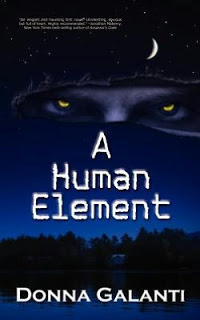 About A Human Element:
About A Human Element:
One by one, Laura Armstrong's friends and adoptive family members are being murdered, and despite her special healing powers, there is nothing she can do to stop it. The killer haunts her dreams and leaves cryptic notes advising her to use her powers to save herself...because she's next.
Read a sample
Add this book to my Goodreads
Your turn, Musers! What techniques do you use to build suspense? Is there an author you love because of their skill at drawing the reader in and keeping them guessing? Let me know in the comments!
ALSO, I hope you'll sneak over to the ever-awesome Shannon O'Donnell's Book Dreaming where I'm chatting about Staying Motivated. I promise you will LOVE some of the links I'm sharing at her blog!

Writing Suspense: Meet Them in the Middle and They Will Come
I’ve learned so much about suspense since writing my first book. One thing I’ve learned in fiction, and movies, is that surprise can be over-rated.
Surprise is the two-seconds of “Boo!” Suspense is the ten-minutes of “Oh, No! Will she die or not?” We’ve all heard go for suspense when you can–and for a reason. It keeps the reader turning pages.
This means the reader needs to know a few things (without giving it all away) so they can predict things, and feel smart. Readers love feeling smart. Don’t we all?
I’ve discovered that if we meet the reader in the middle and let them feel smart, that they will stick with you.
But how can we, as writers, meet the reader in the middle to create suspense?
Tease them with only a few descriptive details
In Harry Potter we all know what Hogwart’s Castle looks like, don’t we? But if you go through the book there are very few descriptions about it. It’s introduced only as a vast castle with lots of turrets and towers. When Harry enters it we’re teased with brief images of flaming torches and a magnificent staircase. That’s it. The reader must fill in the rest with imagination.
By giving the reader flashes of the setting here and there we involve the reader, take them along for the ride, and…build suspense.
Introduce questions early on
Not just one, but many. Drop them here and there. Don’t make it tidy. Make it mayhem with meaning. But make sure those drops do have meaning.
If a knife appears hanging on the wall in the beginning, the reader will question why its there and believe that the knife has importance down the road. (So make sure you show its reason…later.)
Make the reader ask: What happens next? In Watchers by Dean Koontz we witness a depressed man who goes off to a canyon to commit suicide. Will he go through with it? Then he meets a highly intelligent dog and fears for his life from an unknown stalker. Through the dog he meets a timid woman he is intrigued by.
Now we have more questions. Who is this dog? Who is this stalker? How are they connected? Who is this woman? Why is she so shy?
Provide readers with knowledge
New novelists can often be afraid of revealing their best stuff early on. I used to feel the same way. There are tons of pages to fill, after all. That fear can make a writer hoard their best stuff for a surprise–later. But the reader can get bored with waiting, and surprises are overestimated.
Hitchcock, the master of film suspense, used this to build his tension in his movies. He gave the audience information the characters knew and didn’t know, such as the bomb located under their desk.
Tick tock.
Will the character die? Yikes! Maybe, if we’re given all the information we need to suspect death is looming. What makes this suspenseful? Because we spend ten minutes hoping beyond hope the character we love doesn’t die! In the movies or on the page.
Look at the big picture
Movies can provide great visuals for how writers can create suspense. Multiple setups can lead to one big suspense payoff. It’s the knowing what’s about to happen, and then it happens.
In The Godfather, Michael Corleone plans to kill the two mob leaders he meets for dinner. We see the murder planning. The discussion of where to meet. The finding of the gun in the bathroom as a weapon. The wondering of whether Michael will or won’t do it. The knowing that his life will be forever changed if he does.
Creating suspense with a big picture buildup can also create surprise. Here is where surprise can work if everything that led up to the surprise is exposed in a new way.
The big moment at the end in The Sixth Sense isn't just a surprise–it re-arranges everything we know about the events we've seen beforehand in a new way. Did you guess it coming or were you totally surprised?
Set the mood
Provide a suspense setting that creates feelings of heightened anxiety. Give the reader the portent of doom. The setting of a scene can make a large impact on its mood. Use sensory details to build on those feelings–a sudden wind, a stormy sky, a rising stench, a jarring noise. Use world building to create suspense.
Here’s an example of how I aimed for this in my suspense novel, A Human Element:
The sky darkened suddenly. She looked up. Black clouds, thick and angry rolled overhead. Her heart raced faster. The bad feeling screamed again inside her.
"Let's go inside for now." Laura tugged on her mother's sleeve. They would be safer in the house. She just knew it.
"But we can't let our chores go." Fanny's fingers flew across the peas. Slit. Pop. Slit. Pop. Wind whipped around the corner of the house. It knocked over Laura's basket.
Do you think something bad is coming?
Go slow
You’re saying whaaat? Yes. Slow down real time to show the full 360 degrees of the scene. In real life action happens fast. But it’s our job as writers to not show real life. That would be boring and over with in a flash. Show all the angles of the scene to build suspense. Use all the senses. Add complications.
I just read Robert Goolrick’s, A Reliable Wife. In it he moves achingly slow to build suspense. In the beginning scene a man waits at a train station. Nothing is happening. But so much is happening. And so much is to come.
His first paragraph tells us:
It was bitter cold, the air electric with all that had not happened yet. The world stood stock still, four o’clock dead on. Nothing moved anywhere, not a body, not a bird; for a split second there was only silence, there was only stillness. Figures stood frozen in the frozen land, men, women, and children.Oooh, right? Look at his words. Bitter. Electric. Dead. Still. Frozen. Besides going slow he’s also setting the mood with his word choices. These are not soft words. We have a sense of doom. For eleven pages at the train station Goolrick goes slow to build suspense and tension all by focusing on one man’s thoughts and the people who flow around him.
Think that’s going slow? The master of suspense, Dean Koontz, builds suspense over seventeen pages in Whispers with an attempted rape scene.
And don’t forget to create characters to care about
This doesn't mean they shouldn’t be flawless. Giving them flaws makes them more appealingly human, but you won’t create suspense if nobody gives a hoot about your characters.
 Suspense is emotional. It’s about revealing some, but not all.
Suspense is emotional. It’s about revealing some, but not all.And if the reader cares they’ll go out on that limb and meet you in the middle. Build it halfway to create suspense, and they will come.
Donna Galanti is the author of the paranormal suspense novel, A Human Element , called “a riveting debut that had me reading till the wee hours of the night” by international bestselling author M.J. Rose.
She’s lived from England as a child, to Hawaii as a U.S. Navy photographer. Donna lives with her family in an old farmhouse in PA with lots of nooks, fireplaces, and stinkbugs but sadly no ghosts. Visit her at her website, and on Twitter!
 About A Human Element:
About A Human Element: One by one, Laura Armstrong's friends and adoptive family members are being murdered, and despite her special healing powers, there is nothing she can do to stop it. The killer haunts her dreams and leaves cryptic notes advising her to use her powers to save herself...because she's next.
Read a sample
Add this book to my Goodreads
Your turn, Musers! What techniques do you use to build suspense? Is there an author you love because of their skill at drawing the reader in and keeping them guessing? Let me know in the comments!
ALSO, I hope you'll sneak over to the ever-awesome Shannon O'Donnell's Book Dreaming where I'm chatting about Staying Motivated. I promise you will LOVE some of the links I'm sharing at her blog!

Published on September 12, 2012 03:22
September 10, 2012
Sue Quinn: It's a Great Day to Be a Writer
Dude.
Sue Quinn is here today.
SO TOTALLY STOKED!
If you haven't sampled Sue's books, you've got to give them a read. Open Minds is the first in the series, followed by Closed Hearts . I own them both and they're spectacular--smart, intriguing, and just super cool, like Sue herself. She's also wicked savvy when it comes to indie publishing, as you'll see from her post below.
. I own them both and they're spectacular--smart, intriguing, and just super cool, like Sue herself. She's also wicked savvy when it comes to indie publishing, as you'll see from her post below.
In today's publishing world, we have more options than ever. It's definitely a great day to be a writer. As you probably know, Angela and I are self-published authors; we're clearly indie publishing believers. But we're also both pursuing traditional publishing for other projects, so we embrace the benefits of going that route, too. Both paths have value, and the advantages of each have evolved because of the fact that there are options now. Sue chose the self-publishing route, and she's thriving--with the YA audience, no less, an area of indie publishing where success is as evasive and fickle as the muse herself. So I'm excited to share her very experienced thoughts on self-publishing with you.
***********
I knew that Amazon had announced their new Kindles last week - one went straight on the wish list for my mom, who is desperate for a touch reader, her original 2010 Nook 1st Edition being ancient technology now.
What I didn't realize (until the awesome folks at The Writer's Guide to E-Publishing pointed it out) was that Jeff Bezos (CEO of Amazon) gave a press conference. Amazon-loathers of the world, you should skip this part, because this video clip is pure love fest - Bezos loving writers and writers loving him back.
If you're skipping the video, here's the parting scene: Jeff Bezos, CEO of Amazon, leading applause of KDP (Kindle Direct Publishing) authors in the audience, saying "This is transformative stuff."
Why? Why the love from a man whose vision is not to publish books or support authors, but to "be the earth's most customer centric company?"
Clearly, authors make money for Amazon. Before you dismiss that as hopelessly self-interested on Bezos part, think about what that means, when 70% of sales go directly to the indie authors themselves: authors making money for Amazon means they are making a lot MORE money for themselves.
This is an inversion of how publishing has worked in the past, when authors made far more money for their publishers than they did for themselves. This isn't a slam on traditional publishing, but a simple fact: the infrastructure of print (which meant the infrastructure of all publishing, in the past) was an upside down pyramid, with the creative efforts of the author having to support a mountain of rocks, known as paper distribution. With the advent of ebooks, that distribution system became much more efficient. Delivery is instantaneous and extremely inexpensive. There are no middlemen required between the author and the reader, no mountain of rocks the author must support. For the first time, the author is able to keep the lion-share of the earnings from their own creative work.
My mom has been following my writing career, since I first put fingertips to keyboard in pursuit of writing fiction in 2008. She's always been amazingly supportive, no matter what I've done with my life, but she's been flat astounded watching my self-publishing adventures. She told me one day, after one of the many articles I sent her, that she finally realized authors could actually make a living now at what they love. They are "living their dream to dream their livings" as Bufo Calvin said on WG2EP.
And that rocks in a major way.
If all this talk of money feels slightly sordid to you, as a person who does creative work, please understand what this means: making money enables authors to keep writing, write more, and write what they want.
THIS is the true reason why now is a great time to be a writer. For the first time, authors have true freedom to write whatever they please, as frequently as they please, in whatever genre at whatever length they please, without regard to whether it will sell - because the only one taking the risk is themselves. And my observation has been that writers are much greater risk-takers than publishers: it's the nature of creative workers vs. businessmen (of course, the most successful businessmen are also big risk-takers, but that's a different blog post).
I can't self-publish, because I don't want to spend all my time promoting.
Then don't. Simply write and publish. The rest is optional. If you don't believe me, let me tell you the story of a short ebook written from the POV of a goat that made it big. There's no guarantee that your book will be widely loved; the only guarantee is that readers around the planet will have access to it. From there, it's up to you as an author to produce something that people want to read. Or to adore the five fans that "get" your work. Either way, you've done something most writers crave: connected with readers.
I can't self-publish, because I've always dreamed of being in bookstores.
By all means, keep pursuing that dream. For some people, it will pay off - this has always been true, and continues to be. But there are choices now that were never available before, huge unexplored territories in the creative landscape that have been opened. Write a novella from the POV of a secondary character, just for fun? Do that. Write a series of novellas and publish them mere weeks apart? Try that. These are things you can't do in traditional publishing, and if you're not careful in the contract you sign, may be prohibited from doing on your own. If exclusively traditional publishing is your dream, pursue it, but understand the choice you are making and the freedoms you may be giving up to do so.
I can't self-publish, because that's the last resort for hacks who can't make it in traditional publishing.
If this is still your reason, I can't help you. This has been disproven again and again. With 27 of the top 100 books on Amazon being self-published, there's a whole lot of holes in that bucket, and it's just not carrying water anymore.
Here's the plain truth: for the first time, your writing career is in your hands, something that's terrifying to many writers.
But I have faith in you.
If you're brave enough to put pen to paper in the first place, if you have the courage to pour your heart and soul into words on the page, if you dare to share your work with others, taking the slings and arrows of critique in a single-minded devotion to crafting the best story possible: you can handle the challenge of self-publishing in the ebook era.
And if you choose not to, the choice will still be there tomorrow. And that's a very good thing for all writers.
~*~

Susan Kaye Quinn is the author of the bestselling Mindjack series. You can find all her books on Amazon, Barnes&Noble, and iTunes. Susan's business card says "Author and Rocket Scientist," but she spends most of her time writing, because she loves it even more than shiny tech gadgets. When she's not writing, you can find her wasting time playing on Twitter, Facebook, and her blog.
In case you're not convinced that Sue is the reigning Queen of Awesome, she's giving away an e-copy of Open Minds to prove it. For a chance to win, leave a comment. And to double your odds, subscribe to her newsletter and indicate in your comment that you've signed up.
Thanks, Sue, for sharing! You have been and continue to be an inspiration to so many. And thanks for hosting me at your blogtoday. Musers, if you've got the time, please pop over and see what I've got to say about Change Begetting Growth.


Sue Quinn is here today.
SO TOTALLY STOKED!
If you haven't sampled Sue's books, you've got to give them a read. Open Minds is the first in the series, followed by Closed Hearts
 . I own them both and they're spectacular--smart, intriguing, and just super cool, like Sue herself. She's also wicked savvy when it comes to indie publishing, as you'll see from her post below.
. I own them both and they're spectacular--smart, intriguing, and just super cool, like Sue herself. She's also wicked savvy when it comes to indie publishing, as you'll see from her post below.In today's publishing world, we have more options than ever. It's definitely a great day to be a writer. As you probably know, Angela and I are self-published authors; we're clearly indie publishing believers. But we're also both pursuing traditional publishing for other projects, so we embrace the benefits of going that route, too. Both paths have value, and the advantages of each have evolved because of the fact that there are options now. Sue chose the self-publishing route, and she's thriving--with the YA audience, no less, an area of indie publishing where success is as evasive and fickle as the muse herself. So I'm excited to share her very experienced thoughts on self-publishing with you.
***********
I knew that Amazon had announced their new Kindles last week - one went straight on the wish list for my mom, who is desperate for a touch reader, her original 2010 Nook 1st Edition being ancient technology now.
What I didn't realize (until the awesome folks at The Writer's Guide to E-Publishing pointed it out) was that Jeff Bezos (CEO of Amazon) gave a press conference. Amazon-loathers of the world, you should skip this part, because this video clip is pure love fest - Bezos loving writers and writers loving him back.
If you're skipping the video, here's the parting scene: Jeff Bezos, CEO of Amazon, leading applause of KDP (Kindle Direct Publishing) authors in the audience, saying "This is transformative stuff."
Why? Why the love from a man whose vision is not to publish books or support authors, but to "be the earth's most customer centric company?"
Clearly, authors make money for Amazon. Before you dismiss that as hopelessly self-interested on Bezos part, think about what that means, when 70% of sales go directly to the indie authors themselves: authors making money for Amazon means they are making a lot MORE money for themselves.
This is an inversion of how publishing has worked in the past, when authors made far more money for their publishers than they did for themselves. This isn't a slam on traditional publishing, but a simple fact: the infrastructure of print (which meant the infrastructure of all publishing, in the past) was an upside down pyramid, with the creative efforts of the author having to support a mountain of rocks, known as paper distribution. With the advent of ebooks, that distribution system became much more efficient. Delivery is instantaneous and extremely inexpensive. There are no middlemen required between the author and the reader, no mountain of rocks the author must support. For the first time, the author is able to keep the lion-share of the earnings from their own creative work.
My mom has been following my writing career, since I first put fingertips to keyboard in pursuit of writing fiction in 2008. She's always been amazingly supportive, no matter what I've done with my life, but she's been flat astounded watching my self-publishing adventures. She told me one day, after one of the many articles I sent her, that she finally realized authors could actually make a living now at what they love. They are "living their dream to dream their livings" as Bufo Calvin said on WG2EP.
And that rocks in a major way.
If all this talk of money feels slightly sordid to you, as a person who does creative work, please understand what this means: making money enables authors to keep writing, write more, and write what they want.
THIS is the true reason why now is a great time to be a writer. For the first time, authors have true freedom to write whatever they please, as frequently as they please, in whatever genre at whatever length they please, without regard to whether it will sell - because the only one taking the risk is themselves. And my observation has been that writers are much greater risk-takers than publishers: it's the nature of creative workers vs. businessmen (of course, the most successful businessmen are also big risk-takers, but that's a different blog post).
I can't self-publish, because I don't want to spend all my time promoting.
Then don't. Simply write and publish. The rest is optional. If you don't believe me, let me tell you the story of a short ebook written from the POV of a goat that made it big. There's no guarantee that your book will be widely loved; the only guarantee is that readers around the planet will have access to it. From there, it's up to you as an author to produce something that people want to read. Or to adore the five fans that "get" your work. Either way, you've done something most writers crave: connected with readers.
I can't self-publish, because I've always dreamed of being in bookstores.
By all means, keep pursuing that dream. For some people, it will pay off - this has always been true, and continues to be. But there are choices now that were never available before, huge unexplored territories in the creative landscape that have been opened. Write a novella from the POV of a secondary character, just for fun? Do that. Write a series of novellas and publish them mere weeks apart? Try that. These are things you can't do in traditional publishing, and if you're not careful in the contract you sign, may be prohibited from doing on your own. If exclusively traditional publishing is your dream, pursue it, but understand the choice you are making and the freedoms you may be giving up to do so.
I can't self-publish, because that's the last resort for hacks who can't make it in traditional publishing.
If this is still your reason, I can't help you. This has been disproven again and again. With 27 of the top 100 books on Amazon being self-published, there's a whole lot of holes in that bucket, and it's just not carrying water anymore.
Here's the plain truth: for the first time, your writing career is in your hands, something that's terrifying to many writers.
But I have faith in you.
If you're brave enough to put pen to paper in the first place, if you have the courage to pour your heart and soul into words on the page, if you dare to share your work with others, taking the slings and arrows of critique in a single-minded devotion to crafting the best story possible: you can handle the challenge of self-publishing in the ebook era.
And if you choose not to, the choice will still be there tomorrow. And that's a very good thing for all writers.
~*~

Susan Kaye Quinn is the author of the bestselling Mindjack series. You can find all her books on Amazon, Barnes&Noble, and iTunes. Susan's business card says "Author and Rocket Scientist," but she spends most of her time writing, because she loves it even more than shiny tech gadgets. When she's not writing, you can find her wasting time playing on Twitter, Facebook, and her blog.
In case you're not convinced that Sue is the reigning Queen of Awesome, she's giving away an e-copy of Open Minds to prove it. For a chance to win, leave a comment. And to double your odds, subscribe to her newsletter and indicate in your comment that you've signed up.
Thanks, Sue, for sharing! You have been and continue to be an inspiration to so many. And thanks for hosting me at your blogtoday. Musers, if you've got the time, please pop over and see what I've got to say about Change Begetting Growth.

Published on September 10, 2012 05:00
September 8, 2012
Character Trait Entry: Modesty
 Definition
: Humility, freedom from conceit, a moderate attitude toward of one's own abilities.
Definition
: Humility, freedom from conceit, a moderate attitude toward of one's own abilities. Causes : Growing up in a balanced and unpretentious environment; a lack of drive to take advantage of capitalistic opportunities for self-serving gain; a lack of confidence or lower self esteem; a deep understanding of the wide world combined with a heightened sense of one's own worth in the big picture.
Characters in Literature & Pop Culture: Forest Gump (Forest Gump); Dr. Watson (Sherlock Holmes, book); Samwise Gamgee (Lord of the Rings)
Positives : Modest characters tend to have very realistic expectations of others and can be incredibly supportive of friends and family. Modests are contributors, seeing their actions and accomplishments as doing their part to add to the whole. Characters with this trait are responsible and take ownership, providing what is needed to those around them as well as those who lead. Modest people are respectful and especially connect with other people with this same character trait.
Negatives : Modest people can delve too deep into humility, refusing accolades or praise for their accomplishments. This can lead to a feeling of frustration or guilt in others who are trying to recognize them for their hard work and dedication, making them feel like they are taking advantage. Modests can also be self-effacing to the extreme, which can allow those without scruples to absorb credit for themselves instead of giving due. Modests may also judge others by their own humility stick, unfairly condemning those who openly show pride when hard work leads to reward.
Common Portrayals: Female characters living during historical or medieval times when humility and modesty were prized; the hard working employee grateful for a job rather than trying to be a corporate climber; Executives or Political Players who use false humility as a play for affection or approval from those in power (be it higher ups, or voting constituents); socially reserved people (or children) who do not like attention and avoid it.
Clichés to Avoid: the historical 'chaste and modest daughter' trope as a bid for suitors; the falsely modest corrupt character so transparent that readers see through them immediately yet the other characters involved do not.
Twists on the Traditional Modest Character: To stay out of the 'unassumingly Modest and therefore invisible' cliché, give your character strong goals. Modest characters can have big dreams just like anyone else!
Modesty does not have to be equated with 'weak' or social ineptitude. Give us a character who strives to achieve but views his gifts and talents as being a part of who he is rather than making him special or 'better' than others, and we'll root for him all the way.
Conflicting Characteristics to Make your Modest Character Unique or More Interesting: Competitive; Persistent; Wounded; Eccentric

Published on September 08, 2012 03:23
September 6, 2012
WRITING HERO: Gene Lempp
So many people contribute to our writing path, many without even realizing what an impact their support, knowledge and kindness makes. As a feature here at The Bookshelf Muse, I will give some well-deserved recognition to those who really make the Writing Community a better place...people who truly are Writing Heroes.
 Today I'm pleased to call Gene Lempp a Writing Hero. I met Gene through Kristen Lamb's #WANA hashtag on twitter and right away saw just how much he enjoyed connecting with and supporting other writers. Gene works hard to give other writers exposure, both in his daily tweets to blogs and articles, and also through an absolutely fabulous weekly round up aptly named "Writing Blog Treasures". I always find some really great stuff in his links and appreciate him putting it together. It saves me time--something that there's never of, it seems.
Today I'm pleased to call Gene Lempp a Writing Hero. I met Gene through Kristen Lamb's #WANA hashtag on twitter and right away saw just how much he enjoyed connecting with and supporting other writers. Gene works hard to give other writers exposure, both in his daily tweets to blogs and articles, and also through an absolutely fabulous weekly round up aptly named "Writing Blog Treasures". I always find some really great stuff in his links and appreciate him putting it together. It saves me time--something that there's never of, it seems.
Gene is genuine and hard working. He's always ready with a word of support and has built a great community through his blog. Gene is also a big supporter of Author Kait Nolan's A Round of Words in 80 Days, which is a group for writers who know that real life can get in the way of creating and so focuses on 'tailored' goals for the busy writer. (If this sounds like you, check it out!).
He also runs a thought-provoking series on his blog called Designing From Bones, which is a deep look at historical events, places and ideas, and how a writer's imagination can utilize (and twist!) the past to create some incredible fiction. He profiles some unique stuff (like cannibalism) so I highly recommend checking this out. Also, don't forget to find him on Twitter!
Thank you GENE, for being one of my WRITING HEROES. You inspire me!
To pay it forward, I will give a 1000-word critique to Gene, who can choose to keep it for himself or offer it as a giveaway on his blog! As a resident Writing Hero, he will also have a permanent link in our header. If you are looking for great writing information and genuine contributors to our Writing Community, please check out The Bookshelf Muse's full list of WRITING HEROES!
So tell me Musers...do you know Gene Lempp? Has he supported you or helped your writing in some way? Please tell us in the comments and help celebrate this amazing WRITING HERO!
~~ * ~~
Also, You can find Becca over at The View Outside, talking about The Necessary Evils Of Writing with the smart and savvy Vikki Thompson! And there's an Emotion Thesaurus Giveaway, so please head on over and discover a great blog!

 Today I'm pleased to call Gene Lempp a Writing Hero. I met Gene through Kristen Lamb's #WANA hashtag on twitter and right away saw just how much he enjoyed connecting with and supporting other writers. Gene works hard to give other writers exposure, both in his daily tweets to blogs and articles, and also through an absolutely fabulous weekly round up aptly named "Writing Blog Treasures". I always find some really great stuff in his links and appreciate him putting it together. It saves me time--something that there's never of, it seems.
Today I'm pleased to call Gene Lempp a Writing Hero. I met Gene through Kristen Lamb's #WANA hashtag on twitter and right away saw just how much he enjoyed connecting with and supporting other writers. Gene works hard to give other writers exposure, both in his daily tweets to blogs and articles, and also through an absolutely fabulous weekly round up aptly named "Writing Blog Treasures". I always find some really great stuff in his links and appreciate him putting it together. It saves me time--something that there's never of, it seems. Gene is genuine and hard working. He's always ready with a word of support and has built a great community through his blog. Gene is also a big supporter of Author Kait Nolan's A Round of Words in 80 Days, which is a group for writers who know that real life can get in the way of creating and so focuses on 'tailored' goals for the busy writer. (If this sounds like you, check it out!).
He also runs a thought-provoking series on his blog called Designing From Bones, which is a deep look at historical events, places and ideas, and how a writer's imagination can utilize (and twist!) the past to create some incredible fiction. He profiles some unique stuff (like cannibalism) so I highly recommend checking this out. Also, don't forget to find him on Twitter!
Thank you GENE, for being one of my WRITING HEROES. You inspire me!
To pay it forward, I will give a 1000-word critique to Gene, who can choose to keep it for himself or offer it as a giveaway on his blog! As a resident Writing Hero, he will also have a permanent link in our header. If you are looking for great writing information and genuine contributors to our Writing Community, please check out The Bookshelf Muse's full list of WRITING HEROES!
So tell me Musers...do you know Gene Lempp? Has he supported you or helped your writing in some way? Please tell us in the comments and help celebrate this amazing WRITING HERO!
~~ * ~~
Also, You can find Becca over at The View Outside, talking about The Necessary Evils Of Writing with the smart and savvy Vikki Thompson! And there's an Emotion Thesaurus Giveaway, so please head on over and discover a great blog!

Published on September 06, 2012 03:23
September 4, 2012
Margie Lawson Extravaganza (Part 2!)
 When I found out the awesome and talented Melinda Collins was headed off to Colorado to attend Margie Lawson's Immersion Master Class, I absolutely had to convince her to swing by and tell us about the experience afterward. Of course, Writing Superhero Jami Gold had the same idea, so rather than stage an EPIC, lightning-sword-and-killer-unicorn BATTLE TO THE DEATH as to who got Melinda, we decided to share her. Isn't that nice? *beams*
When I found out the awesome and talented Melinda Collins was headed off to Colorado to attend Margie Lawson's Immersion Master Class, I absolutely had to convince her to swing by and tell us about the experience afterward. Of course, Writing Superhero Jami Gold had the same idea, so rather than stage an EPIC, lightning-sword-and-killer-unicorn BATTLE TO THE DEATH as to who got Melinda, we decided to share her. Isn't that nice? *beams*As someone who purchased a Margie Lawson Lesson Packet on Body Language (thanks for the heads up, Stina Lindenblatt!) in the past, I can only imagine the value of a ML Intensive. So please, read on dear Musers. It's a long-ish post, but oh-so-worth it. AND, the talented Margie Lawson is going to award a lucky commenter with a FREE Lecture Packet! Trust me, YOU WANT THIS.
Immersion Master Class with Margie Lawson: The Experience, The Takeaways, The Lessons – Part Two
Thank you, Angela, for inviting me over today to talk about my recent experience in Colorado with the wonderful, talented, writerly genius, Margie Lawson, and her Immersion Master Class!
Because I have so much to share, this is actually a two-part blog post. Which means I’m also over at Jami Gold’s blog today as well with part one! *grin* And, as an added bonus, Margie Lawson will be over at my blog today, Muse, Rant, Rave, sharing even more writing technique goodies! *booty dance* Okay, enough dancin’ and let’s get to learnin’, shall we?
The Experience
Over on Jami’s blog I talked about the kinship and sisterhood that developed in our group. Here I’d like to share with you two additional elements of the class that made this a one-of-a-kind experience.
The first would be location, location, location! We were about two miles above sea level, and being that high meant cell service was practically nonexistent, which in turn meant we got to enjoy the peace and quiet tranquility of the Rocky Mountains. What more inspiration do you need if you look outside the window, or go on a short hike and see this?

The view from our 1st hiking trip
Pretty unreal, right? But this is exactly what every day was like for us. It wasn’t all work and no play. In fact, we went hiking twice during our time on the mountain. The first short hike gave us the beautiful view in the picture above, and the second, longer hike, gave us this gorgeous view:

The view from our 2nd hiking trip
So the experience was deeper than just learning more about yourself and your writing craft. It was about taking the time to enjoy your surroundings and find inspiration in nature.

The view from Margie's writing loft
The second element I wanted to share about the experience is the one on one time each of us got to spend with Margie. Every day, with pages in hand, we walked into a quiet, cozy room and worked one on one with Margie – an experience that will stay with me forever. By sitting down with her, one on one, you gain a certain understanding and perspective of your writing. You learn how to channel the genius editing that is her mind, and you see your writing in a whole new light. Every sentence, every word is purposefully chosen to pack a maximum punch for your reader, and during your one on one time, you learn more about how you choose those words and how you organize your sentences.
I can’t begin to imagine how I was editing before this class because now I feel as though I’m walking away with a particular sense of how to attack edits, how to look for the minor nuances, how to portray action scenes in a new and exciting way for the reader, and how to make my prose sing a beautifully cadenced tune.
The Takeaways
In part one I talk about what I learned about my style and where I want to be a year from now. Here I’d like to talk about group settings: why it’s important to work within a group where each person has the same purpose in their writing, and why it’s important to encourage and help other writers make their writing the best it can possibly be.

It's always important to take a break when editing to hike! ;)
When you’re in a group setting and everyone has the same purpose of making their MS NYT Bestselling-worthy, you’re sitting in a gold mine. This is why it’s so incredibly important to join a writing group where everyone is dedicated and everyone pushes you to strive, work, and think harder. Sure, writing’s a singular experience (unless you’re co-writing), but without that group of writers who share your struggles, your doubts, and your triumphs, you may not get too far. This particular experience brought that fact home for me. When I struggled in making a phrase powerful and pitch-perfect, there were four other writers there tossing ideas back and forth until we got it. I’m sure without them there I might’ve gotten 85% of what I wanted in the phrase, but that’s not enough. I want 100%. I want it to pack a punch. And I want the help of other writers who fill in the gaps of my weaknesses.
This is another reason why it’s important to not only be in a group setting with a common purpose, but also to encourage other writers and their craft. We thrive on the encouragement and the kudos we get from others like us. We hear of another writer who’s just finaled
Individually, we are one drop. Together, we are an ocean. -- Ryunosuke Satoro
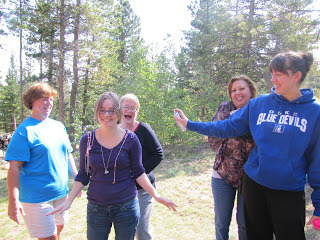
I got the honor of silly-stringing Amanda! Sooo much fun!!! :)
Quick note: While we were there, one of our Immersion Sisters, Amanda, actually did find out that she finaled in a writing contest with three scores of 99 out of 100!!!!! WOO HOO! How AWESOME is that?!? So what did we do to celebrate when we found out? We silly-stringed her of course!!!
The Lessons
Without giving away too much, here’s the back half of the top ten lessons I learned while in Colorado (as I said in the first post, there are many, many, many more):
1. Description: Description shouldn’t be on the page simply just to be there. Description should be on the page as it affects the character. When you’re writing description, think of how it affects your character in terms of their attitude and thoughts. If you had a character pull up to their childhood home, don’t just describe it as having paint-chipped shutters and a bright red door. Attach that description to your character. What does she remember about those shutters and that red door? Does she recall the many summers she spent helping her mother repaint the shutters? Does she recall being caught kissing a boy in front of the bright red door? If so, then why don’t you attach that description to those memories and make it a stronger, more powerful read?
Example from my MS:
I took a breath and walked out to the edge of the street. This house would represent the beginning of the rest of my life. I hadn’t seen the midnight blue, oceanfront home in so long, and it was now my home.
Because a home is a sense of trust, safety and love for my MC, I attached those feelings to the description of a place that is now her home. There’s more description of the house that follows this, but this is the one place where I purposefully showed how arriving to this setting affected my character.
2. Breaking Tension: Margie has an EDITS system that uses different colored highlighters to track story elements. One is tension. When you’re tracking tension and you notice a small – or big – area where you’ve broken the tension, you’d better go back to check the following:
a. Check to ensure you intended to break the tension.
b. Check to ensure the break in tension is not only needed, but that it works
c. Check to ensure it doesn’t entice the reader to skim
I’m willing to bet there may be several areas where you didn’t intend to break the tension, you didn’t intend to invite the reader to skim, you didn’t intend to put a humor hit in the middle of a serious scene that shouldn’t be broken.
So if you break tension, make sure it’s intentional, it works, it flows, and it doesn’t bore the reader in skipping ahead to where the tension picks back up.
3. NO ‘ITs’ or ‘THATs’: I now have yet another new item to add to my editing toolbox/checklist: NO ‘ITs’ or ‘THATs’!! Okay, so obviously I don’t mean you can’t have ‘it’ or ‘that’ in your MS as at all. But what I do mean is don’t end a sentence with ‘it’ or ‘that.’
Example:
Oh yeah, I’d considered that.
See what I mean? When I take this sentence out of context, you have absolutely no clue what the character meant by ‘that.’
Example without ‘that’:
Oh yeah, I’d considered Nick to be nothing more than an ant.
A-ha! So when I removed ‘that,’ I made the sentence stronger and more powerful! So the lesson here is: do a find for ‘IT’ and ‘THAT’ and restructure/reword each sentence/phrase that just so happens to end with one of those UNLESS having one of those two words 100%, unequivocally works!

4. Throw-Away Words (Tightening): Another important item to add to your editing checklist: throw-away words. This goes beyond the usual crutch words such as saw, felt, was, etc. Once of the techniques Margie teaches is taking a printed copy of your MS and reading through, line by line, and checking each line off to ensure it has a strong cadence. This ensures you don’t have any words in there that might trip the reader or the flow of the passage. As we all know, there are many other types of throw-away words that can tongue-tie the reader – which is another reason why it’s incredibly important that we get used to the sound of our voice, read everything aloud, and tighten, tighten, tighten.
Examples with Throw-Away Words:
After all, it wasn’t my fault their stories weren’t being told anymore.
I looked back at where he stood and touched my cheek.
Did I really need all those words? Nope.
Examples without Throw-Away Words:
It wasn’t my fault their stories weren’t being told anymore.
I touched my cheek.
See? I didn’t need after all and looked. Those were just two sentences! And between the two, I cut a total of nine words! By reading through my MS, line by line by line, and checking each one off once I’ve determined it’s a TEN, I will have a MS that’s tight, tight, tight! *booty dance*
5. Backloading: Ah… this is a fun one! But because there’s so much I could say about it and so little space in today’s post, I’m going to make it short and sweet. Backloading is where you take the most powerful word in a sentence, and you rework the phrase to pack that power at the end of the sentence so it resonates with the reader.
Example before Backloading:
And when we did see him, we never took a moment for granted, but that was before he abandoned us.
The most powerful word in this particular phrase is abandoned. When you hear it, you instantly feel for the character because you may know what it’s like to feel abandoned. So why not make it the last word the reader processes before they move to the next paragraph?
Example after Backloading:
And when we did see him, we never took a moment for granted. But that was before we were abandoned.
Not only did I ensure my power word was there to backload the phrase, I also split that large phrase into one semi-big sentence then followed it up with a shorter, powerful sentence.
Backloading forces you to look at the structure of your sentences and paragraph breaks. By examining each sentence with a finely-tuned, analytical eye, you’ll not only catch the instances where backloading will pack a punch, but you’ll also catch the areas where one larger sentence can be broken into two, shorter, more powerful sentences. Ha! I got two lessons into one on that one! *giggle*
Once again, I really, really, really want to encourage everyone to visit Margie’s site, purchase and read and absorb the lecture packets and/or enroll in an online course. After you’ve done that, I really recommend attending an Immersion Master Class yourself to fully learn not only these techniques/lessons, but waaaaay more! In all her courses, you’ll learn ways to add psychological power to your writing and how to write a page-turner that will keep your readers up until their spouse finally says, “Pleeeease come to bed!” *giggle*
Before I go, I just want to say thank you again to Angela for having me over today and allowing me to share a small percentage of what I learned!
If this was your first stop, then before you pop over to either Jami’s site for more on the experience, the takeaways and the lessons, or stop by my blog for a quick lesson from Margie, think about the following: Do you have a place you can get away to? One that’s quiet, calm and inspiring? What about a writing group – do you have a group of writers that you can learn from, give kudos to, and share your triumphs with? Do you have areas in your MS that could benefit from tying description to emotion? Or what about areas where you’ve broken the tension unintentionally? Do you run through each of your lines and ensure they work 100% before moving onto the next?
[image error]Wow! Thank you Melinda for being so generous and sharing your amazing experience with Margie! I am a life-long learner, and I absolutely love to absorb as much as I can about the writing craft. Margie's lecture packets are packed with great information and I am thrilled to be able to give one away. So, if you would like to win, just comment below and leave some contact information. THEN, visit Jami for another chance to win a lecture packet and Melinda's for a crack at an online course with Margie! This is the BERMUDA TRIANGLE OF WIN, people!
Good luck & happy writing!

Published on September 04, 2012 04:35
September 1, 2012
Character Trait Entry: Peacemaker

Definition : one who placates; one who seeks to divert conflict
Causes : growing up in an environment rife with conflict; growing up in an environment where peace and cooperation were valued; wanting to appease, wanting everyone to be happy; having seen the results of conflict and desiring to avoid it at all costs; a natural tendency toward diplomacy
Characters in Literature & Pop Culture: Mole (The Wind in the Willows), Susan (The Chronicles of Narnia), Bilbo (at the beginning of The Hobbit)
Positives : Peacemakers, by definition, keep the peace. They don't rock the boat and go out of their way to avoid conflict. Since they value the happiness of others, they're usually people-oriented and sacrificial, deferring to others in order to maintain good relations.
Negatives : As much as we hate conflict, it's often necessary to elicit good change. Peacemakers will often attempt to deflect even necessary conflict in order to achieve peace. It's also nearly impossible to placate everyone, so while peacemakers have good intentions, their methods tend to complicate simple matters and frustrate the people involved. When taken to extremes, peacemakers value peace above all else and will vacillate in their convictions to maintain it. In the eyes of others, they're wishy-washy and pliable and are incapable of taking a stand on important issues because of their fear of alienating anyone.
Common Portrayals: religious figures, children, abuse victims, women
Clichés to Avoid: the meek, quiet, peacemaker; the wife/mother who runs interference between her husband and children
Twists on the Traditional Peacemaker:
Because peacemakers want to placate others, they're often soft-spoken and proper. What about a peacemaker who is loud and clumsy?
Peacemakers are usually characters who are taken seriously: mothers, grandmothers, etc. To twist the cliché, give your peacemaker a humorous quirk, like extreme superstition. Or flatulence.
Since they tend to avoid conflict, peacemakers are usually cast in the supporting role. It would be an interesting challenge to see a peacemaker as a hero who must embrace conflict to achieve a worthy goal
Conflicting Characteristics to Make your Peacemaker Unique or More Interesting: foul, sneaky, fierce, opinionated, disobedient, stubborn

Published on September 01, 2012 00:00
August 30, 2012
NEW Writing Resource: Writing Grief in Fiction
Hi everyone! Today I'm welcoming my good friend
Denise Jaden
, author of Losing Faith and Never Enough (Simon Pulse), two very powerful contemporary Young Adult novels. I am thrilled to be able to share the news (and the cover) of Denise's foray into writing craft books! Her upcoming October release, Writing With A Heavy Heart: Using Grief and Loss to Stretch Your Fiction looks to be an excellent resource for all writers and I can't wait to get my hands on it! Rather than me explain how this book will help writers infuse their work with raw emotion, I'll turn it over to Denise.
A New Writing Craft Book: Writing Grief in Fiction
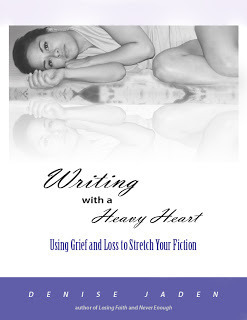 Grief alone is not enough to make a novel. It’s the backdrop, sometimes the obstacle, but books must be flavored with other emotions. Many an agent or editor will tell you that the first few pages of a manuscript are vital to selling your work. This is especially true in a work that deals with heavy subject matter. One question writing professionals may have in the back of their minds as they read the description of your book is, “Will this book be too heavy-handed?”
Grief alone is not enough to make a novel. It’s the backdrop, sometimes the obstacle, but books must be flavored with other emotions. Many an agent or editor will tell you that the first few pages of a manuscript are vital to selling your work. This is especially true in a work that deals with heavy subject matter. One question writing professionals may have in the back of their minds as they read the description of your book is, “Will this book be too heavy-handed?”
While preparing to teach a workshop for the Society of Children’s Book Writers and Illustrators (SCBWI) in early 2011, I began to study the subject of grief in fiction. I chose the topic because both of my books at the time (one out on shelves, the other about to release) had the common theme of a character facing grief. I hoped to look back over my process of writing these books and find a number of enlightening nuggets to teach other writers about how to use grief more effectively in fiction.
It turned out, after scouring through my manuscripts and revisions, I felt like I actually had very little to share. I started to think about how much research I was going to have to do in order to put together an informative presentation on grief—a subject I was starting to believe I knew very little about.
Later that spring, a series of wrecking balls came pummeling at my life that quickly changed my understanding and knowledge on the subject. My tragedies started with a painful and heart-breaking miscarriage. Shortly after that, my dad died in a sudden and unexpected work accident. My family was close, so this was certainly the most brutal of the wrecking balls. In the aftermath of the accident, my son took a fall and had to be rushed to the hospital with a head wound, and finally, my husband’s place of business burned down. All of these things happened in a matter of about four months. These were all unexpected losses, and even though a year later, I am seeing some wonderful things that have come as a result—a closer family, a more prosperous working environment—the losses still affect me almost every day.
As much as I didn’t want it, I’ve had the opportunity to think on some teachable aspects of grief as I was walking my journey. I’m not a doctor or counselor. I am only a person who has explored fictional grief, experienced true grief, and written down some conclusions of how to better work the subject matter into writing.
I talk about how to increase conflict and create more engaging characters through grief and loss. Through explanation, examples, and exercises, I look at many different aspects and expressions of grief and apply it to a variety of characters and stories. Grief is not a story on its own, but it can be used to push things further.
I’ve highlighted specific ideas of how to reflect each part of the grieving process, without any melodrama, and increase character depth and conflict at the same time. I hope they’ll spur you on to come up with many of your own ideas of how to stretch your stories and prod your characters into a more engaging story!
This new book is both a labor of love and of pain, and I hope it will help enrich both your fiction and your life.
 Writing With A Heavy Heart: Using Grief and Loss to Stretch Your Fiction
Writing With A Heavy Heart: Using Grief and Loss to Stretch Your Fiction
In her first non-fiction mini-book, Denise Jaden explores the stages and outlets of grief and how to implement them into your fiction to create more interesting characters and a more engaging plot. Some topics of this book include: grieving before the loss, spiritual matters, and how grief affects different ages, personality types and gender.
~ ~ ~
You guys know Becca and I, and how we are all over anything to do with emotion. I think I speak for both of us to say we're excited for this book, because we are huge advocates of using personal experience to bring realism to the portrayal of a character's feelings. This is a difficult area of emotion, one that many writers struggle with to write authentically. Denise's experiences with grief, along with her incredible mastery of it in her fictional worlds make this a must-read for me.
If you want to stay in the loop in regards to this release, make sure to visit Denise's blog, follow her on Twitter and add her book to your Goodreads list!

A New Writing Craft Book: Writing Grief in Fiction
 Grief alone is not enough to make a novel. It’s the backdrop, sometimes the obstacle, but books must be flavored with other emotions. Many an agent or editor will tell you that the first few pages of a manuscript are vital to selling your work. This is especially true in a work that deals with heavy subject matter. One question writing professionals may have in the back of their minds as they read the description of your book is, “Will this book be too heavy-handed?”
Grief alone is not enough to make a novel. It’s the backdrop, sometimes the obstacle, but books must be flavored with other emotions. Many an agent or editor will tell you that the first few pages of a manuscript are vital to selling your work. This is especially true in a work that deals with heavy subject matter. One question writing professionals may have in the back of their minds as they read the description of your book is, “Will this book be too heavy-handed?”While preparing to teach a workshop for the Society of Children’s Book Writers and Illustrators (SCBWI) in early 2011, I began to study the subject of grief in fiction. I chose the topic because both of my books at the time (one out on shelves, the other about to release) had the common theme of a character facing grief. I hoped to look back over my process of writing these books and find a number of enlightening nuggets to teach other writers about how to use grief more effectively in fiction.
It turned out, after scouring through my manuscripts and revisions, I felt like I actually had very little to share. I started to think about how much research I was going to have to do in order to put together an informative presentation on grief—a subject I was starting to believe I knew very little about.
Later that spring, a series of wrecking balls came pummeling at my life that quickly changed my understanding and knowledge on the subject. My tragedies started with a painful and heart-breaking miscarriage. Shortly after that, my dad died in a sudden and unexpected work accident. My family was close, so this was certainly the most brutal of the wrecking balls. In the aftermath of the accident, my son took a fall and had to be rushed to the hospital with a head wound, and finally, my husband’s place of business burned down. All of these things happened in a matter of about four months. These were all unexpected losses, and even though a year later, I am seeing some wonderful things that have come as a result—a closer family, a more prosperous working environment—the losses still affect me almost every day.
As much as I didn’t want it, I’ve had the opportunity to think on some teachable aspects of grief as I was walking my journey. I’m not a doctor or counselor. I am only a person who has explored fictional grief, experienced true grief, and written down some conclusions of how to better work the subject matter into writing.
I talk about how to increase conflict and create more engaging characters through grief and loss. Through explanation, examples, and exercises, I look at many different aspects and expressions of grief and apply it to a variety of characters and stories. Grief is not a story on its own, but it can be used to push things further.
I’ve highlighted specific ideas of how to reflect each part of the grieving process, without any melodrama, and increase character depth and conflict at the same time. I hope they’ll spur you on to come up with many of your own ideas of how to stretch your stories and prod your characters into a more engaging story!
This new book is both a labor of love and of pain, and I hope it will help enrich both your fiction and your life.
 Writing With A Heavy Heart: Using Grief and Loss to Stretch Your Fiction
Writing With A Heavy Heart: Using Grief and Loss to Stretch Your FictionIn her first non-fiction mini-book, Denise Jaden explores the stages and outlets of grief and how to implement them into your fiction to create more interesting characters and a more engaging plot. Some topics of this book include: grieving before the loss, spiritual matters, and how grief affects different ages, personality types and gender.
~ ~ ~
You guys know Becca and I, and how we are all over anything to do with emotion. I think I speak for both of us to say we're excited for this book, because we are huge advocates of using personal experience to bring realism to the portrayal of a character's feelings. This is a difficult area of emotion, one that many writers struggle with to write authentically. Denise's experiences with grief, along with her incredible mastery of it in her fictional worlds make this a must-read for me.
If you want to stay in the loop in regards to this release, make sure to visit Denise's blog, follow her on Twitter and add her book to your Goodreads list!

Published on August 30, 2012 02:23
Writers Helping Writers
A place for writers to find support, helpful articles on writing craft, and an array of unique (and free!) writing tools you can't find elsewhere. We are known far and wide for our "Descriptive Thesau
A place for writers to find support, helpful articles on writing craft, and an array of unique (and free!) writing tools you can't find elsewhere. We are known far and wide for our "Descriptive Thesaurus Collections" which help authors create vivid imagery and sensory detail for their Settings, Characters (physical descriptions, emotions, skills & talents, etc.), Symbolism, Weather, and a whole bunch more. Stop in and say hello! :) http://writershelpingwriters.net/
...more
- Angela Ackerman's profile
- 1023 followers



